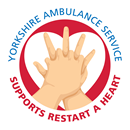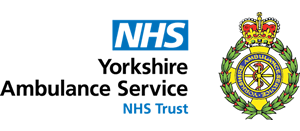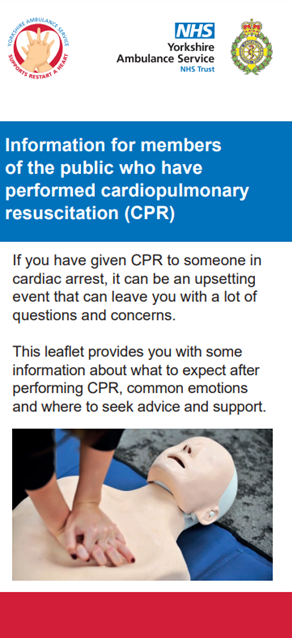Information for members of the public who have performed CPR

If you have given CPR to someone in cardiac arrest, it can be an upsetting event that can leave you with a lot of questions and concerns.
We have teamed up with the Resuscitation Council UK to provide you with some information about what to expect after performing CPR, common emotions and where to seek advice and support.
Thank you
Firstly, thank you for stepping in and performing CPR and/or using a defibrillator. By performing CPR, you have given the patient the best prospect of survival by providing the ambulance crew with a fighting chance of achieving success with their life-saving efforts once they arrive on scene.
Sometimes, in the pace of the situation and the urgency to get to hospital, ambulance crews don’t get the time to properly thank individuals for stepping in and performing CPR or answering any questions you may have.
It is not unusual, once the ambulance has left scene, for the bystander who performed CPR to hear nothing further about the patient’s outcome. However, despite your best efforts, the outcome is often not what we would have hoped; this is due to the severity of illnesses that lead to cardiac arrest.
Unfortunately, this uncertainty about the outcome often leaves bystanders wondering if they performed CPR correctly or worried they may have done something wrong. It is normal to experience these feelings.
What you might feel
Following these incidents, bystanders have reported feeling:
- shocked and terrified
- emotional
- tired
- confused
- needing to isolate
- anxiety or suffering from ‘flashbacks’
- alone
- self-doubt or uncertainty
- like blaming themselves.
Sometimes these incidents can also cause:
- insomnia or nightmares
- difficulty concentrating.
The process of getting ‘back to normal’ is different for everyone. Be kind to yourself and look after yourself afterwards. If the emotions detailed above don’t go away or get worse it is important you make an appointment to see your GP.
What happens after you have performed CPR?
Currently the survival rate for people who have an out-of-hospital cardiac arrest is just less than 10%.
By calling 999 and giving CPR you are doubling their chance of survival by helping to restore blood flow to the brain and other vital organs. Without CPR, the patient will die within minutes.
The success of CPR is dependent on many factors including:
- the underlying cause of the cardiac arrest
- the type of cardiac arrest rhythm (not all rhythms can be shocked with a defibrillator)
- the length of time before CPR started
- the length of time before advanced care arrived on scene.
Those who do survive are often critically unwell and are likely to need some treatment in intensive care or a coronary care unit. With good CPR and prompt defibrillation, many patients can make an excellent recovery.
Where can I get more information?
- British Heart Foundation has support for those who have given CPR, including the opportunity to speak to a cardiac nurse by calling its Heart Helpline on 0300 330 3311.
- Sudden Cardiac Arrest UK offers information on cardiac arrest and its after effects, primarily targeted at survivors and their families but is useful for understanding the impact of a resuscitation attempt.
- Chain of Survival UK is a community for those who have participated in or witnessed a resuscitation.
Where can I get psychological help?
This information is also available in leaflet form by clicking on the image below.


